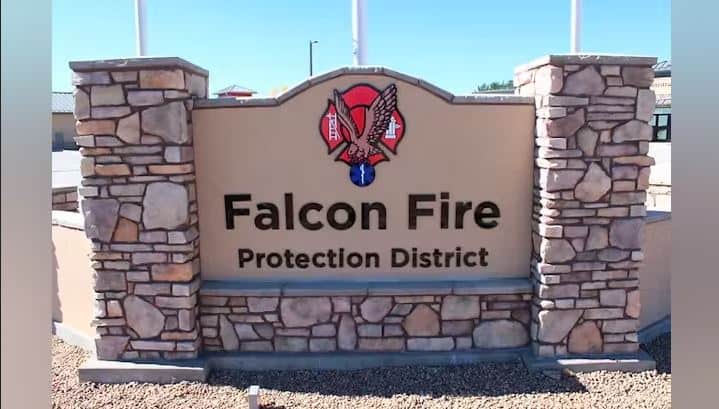The Falcon Fire Protection District invites everyone to take part in Fire Prevention Week, which takes place Oct. 5 through Oct. 11. This yearís theme is ìWorking Smoke Alarms Save Lives ñ Test Yours Monthly.îThereís no denying that working smoke alarms save lives. According to the National Fire Protection Association, about 60 percent of reported home-fire deaths between 2007 and 2011 occurred in homes with no smoke alarms or smoke alarms that didnít work. Having a working smoke alarm in a home cuts the risk of dying in a fire by half. Missing, disconnected or dead batteries are the most common reason that smoke detectors fail to operate. Here are some tips to ensure that smoke alarms will work when they are most needed:
- Install smoke alarms in every bedroom, outside each separate sleeping area and on every level of the home, including the basement.
- Interconnect all smoke alarms throughout the home. This way, when one sounds, they all do.
- Test alarms at least once a month by pushing the test button.
- Replace all smoke alarms when they are 10 years old, or sooner if they donít respond properly during a test.
- Make sure everyone in the home knows the sound of the smoke alarm and understands what to do when they hear it.
When researching smoke alarms, consumers might notice different kinds of alarms on the market. An ionization smoke alarm is generally more responsive to flaming fires, while a photoelectric smoke alarm is generally more responsive to smoldering fires. For the best protection or where extra time is needed to awaken or assist others in evacuating the home, the NFPA recommends installing both types of alarms, or combination ionization and photoelectric alarms. The NFPA has more detailed information on installing and maintaining smoke alarms at its website at http://ow.ly/zuWu2
Kidde recalls smoke alarmsIn September, the U.S. Consumer Product Safety Commission announced a recall of Kidde hard-wired smoke and combination smoke/carbon monoxide alarms because they could fail to alert consumers of a fire or a CO incident following a power outage.The defective alarms were sold at CED, City Electric Supply, HD Supply, Home Depot, Menards Inc.; and other retailers, electrical distributors; and online at Amazon.com, HomeDepot.com, and shopkidde.com from January through July. The alarms were priced between $30 and $50.No incidents or injuries have been reported. The recall, which affects an estimated 1.2 million units in the United States and about 112,000 in Canada, involves the following Kidde products:
- Residential smoke alarm model i12010S with manufacture dates between Dec. 18, 2013 and May 13, 2014
- Combination smoke/CO alarm il2010SCO with manufacture dates between Dec. 30, 2013 and May 13, 2014
- Combination smoke/CO alarm model KN-COSM-IBA with manufacture date between Oct. 22, 2013 and May 13, 2014
Alarms are hard-wired into a homeís electric power. The il2010S and il2010SCO come with sealed 10-year batteries inside. The KN-COSM-IBA model has a compartment on the front for installation of replaceable AA backup batteries. The alarms are white, round, and measure about 5 to 6 inches in diameter. Kidde is engraved on the front of the alarm. Kidde, the model number and manufacture dates are printed on a label on the back of the alarm. ìAlways Onî is also engraved on the front of alarms with sealed 10-year batteries.The CPSC advises consumers to immediately contact Kidde for a free replacement. Consumers should keep using the recalled alarms until they install replacement alarms. Contact Kidde toll-free at (844) 553-9011 from 8 a.m. to 5 p.m. ET Monday through Friday, or online at http://kidde.com and click on ìRecallsî for more information.
FFPD receives grant for mechanical chest compressorFarmers State Bank has awarded FFPD a grant to purchase a mechanical chest compressor. This device is strapped to a patient in cardiac arrest and mechanically delivers chest compressions during cardiopulmonary resuscitation. Mechanical CPR can deliver consistent high-quality compressions, especially in the back of a moving ambulance, which often results in better patient outcomes.
Second grade programFFPD firefighters have been busy visiting local classrooms to present safety information. In September, firefighters discussed motor vehicle safety and fire safety with second graders at Falcon, Woodmen Hills and Meridian Ranch elementary schools. Topics included wearing seatbelts, not playing in or around parked cars and creating fire escape plans at home. The second grade safety program, which is coordinated by FFPD firefighter Matt Gibbs, continues throughout the school year and covers subjects such as preventing falls, water safety, and choking prevention.Lt. Corey Kirt said the second-grade safety program is important because ìit gets that information to them (the children) at a young age.î The kids then take that information home and share it with their parents and families. The program also gives children the opportunity to meet their local firefighters in person.
FFPD community receives Firewise designationThe Goshawk Homeowners, running north of Hodgens Road, has earned Firewise Communities/USA recognition for its efforts to reduce the vulnerability of homes and landscapes to wildfire. This is the first Firewise Community designation within the Falcon Fire Protection District. FFPD fire marshal Margo Humes said the Firewise certification is a tremendous accomplishment. ìIt represents a lot of hard work Ö Iím just really proud of them,î she said. The Goshawk Homeowners will be formally recognized at a small ceremony in October.
FFPD helps with ALS ice bucket challengeOn August 28, FFPD helped fulfill an ALS ice bucket challenge at Woodmen Hills Elementary School. Principal Kelly Warren and assistant principal Mike Miller, who endured ice and water sprayed from fire engines, were challenged by school staff to raise money for ALS (amyotrophic lateral sclerosis, also known as Lou Gehrig’s Disease). The challenge honored the Mullinex family, who lost husband and father Jason to ALS in July 2012.





